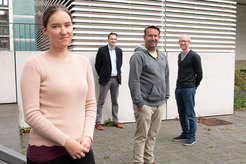Trigger for aggressive tumours in chronic lymphocytic leukaemia identified
Target for drug therapy
Patients with chronic lymphocytic leukaemia can develop in the course of the disease aggressive lymphoma. The research groups led by Prof. Dr. Christian Pallasch from the University Hospital in Cologne and Dr. Thomas Wunderlich from the Max Planck Institute for Metabolism Research have now been able to identify a protein that is responsible for the development of aggressive lymphoma in many cases. This protein could be a target for drug therapies.

Every year, about 6000 people in Germany develop chronic lymphatic leukaemia. This type of leukaemia thus is the most common form of leukaemia in the western world and occurs mainly in older age. About two to ten percent of patients develop an aggressive lymphoma in the course of the disease. Only limited treatment options are currently available for these patients. The processes that trigger the transformation into an aggressive tumour are not yet known.
Protein kinase B - a decisive switch
The Cologne researchers suspect a protein called protein kinase B as the trigger of the aggressive lymphomas. This protein acts in a signalling pathway which, among other things, influences cell division, maturation and survival of certain blood cells. They studied tumour samples from leukaemia patients with and without aggressive lymphoid tumours. "Our data show that activation of the protein is frequently observed in aggressive tumours, both with and without genetic mutations in risk genes", says Vivien Kohlhaas, one of the three first authors of the study. "This suggests that the signalling pathways activated by the protein in tumour cells are a key feature in disease progression."
The researchers were able to confirm the crucial role of the protein in the development of an aggressive tumour in mice with lymphomas in which the protein was permanently switched on. This sustained activation transformed the leukaemia into an aggressive lymphoma. The clinical features of these mice were consistent with the observations in human patients.
New biomarker and treatment option
“In summary, our data suggest that the development of the aggressive tumours in these leukaemia patients is not only dependent on mutations in risk genes, but can also be triggered by an altered status of a potentially oncogenic signalling pathway", says Dr. Thomas Wunderlich from the Max Planck Institute for Metabolism Research. "Protein kinase B could be considered as a new biomarker for high-risk leukaemia. Inhibiting the signalling pathway we identified may enable a future treatment option", Prof. Dr. Christian Pallasch from the University Hospital of Cologne is confident.












